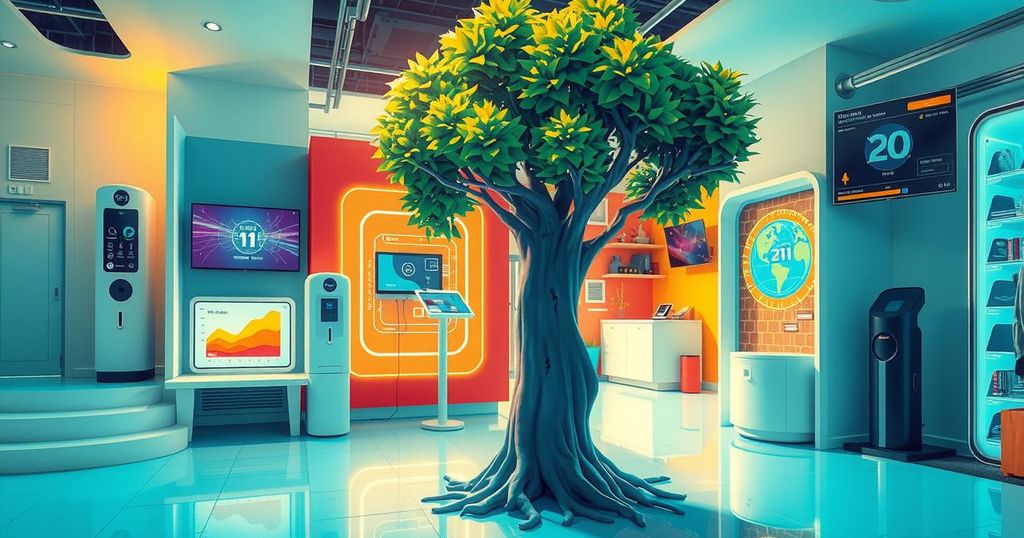AI
Science
ASIA, CHATGP, CHATGPT, EUROPE, FRANCE, GULF, HASHIMOTO, HEALTH, LAUREN, LAUREN BANNON, MARLY GARNREITER, MEDICINE, MENTAL HEALTH, NORTH AMERICA, PANDEMIC, PARIS, SCIENCE, SOCIAL MEDIA, TRINITY COLLEGE, TRINITY COLLEGE DUBLIN, UAE, UNITED ARAB EMIRATES, UNITED STATES
Amina Hassan
0 Comments
AI: From Medical Diagnoses to Digital Avatars, Its Impact Unfolds
A recently released report highlights the remarkable uses of AI, from diagnosing hidden cancers in patients when doctors missed key signs to providing legislation assistance in the UAE. Additionally, innovative projects like ‘The Talking Tree’ at Trinity College Dublin showcase creative applications of AI in nature, while breakthroughs in shopping, filmmaking, and even virtual engagements with deceased loved ones hint at the diverse and sometimes controversial impacts technology is having on our lives.
In an incredible twist of fate, a 40-year-old woman, Lauren Bannon, from the United States found her health mystery solved through AI. Starting in February 2024, she had difficulty bending her fingers. Doctors, mistakenly diagnosing her with rheumatoid arthritis, missed the mark even after she tested negative. Soon, excruciating stomach pain followed, with her losing 14 pounds in merely a month, yet they attributed it to acid reflux. Unconvinced, Bannon consulted ChatGPT for another perspective, which suggested Hashimoto’s disease. Insisting on further testing in September 2024, she discovered ChatGPT was right—an ultrasound revealed two cancerous lumps in her thyroid.
And Bannon isn’t alone in this AI-assisted medical journey. A 27-year-old woman from Paris, Marly Garnreiter, faced her own ordeal with persistent night sweats and itching. Her doctor’s tests turned up nothing alarming, but ChatGPT predicted a possible case of blood cancer. Worsening fatigue and chest pain eventually led her to seek emergency help, and scans revealed Hodgkin lymphoma—a diagnosis that matched what AI had hinted at nearly a year earlier.
Perhaps chasing the whimsy of nature, a team at Trinity College Dublin has turned a remarkable 200-year-old tree into ‘The Talking Tree’. Using advanced AI and environmental sensors, they’ve translated the tree’s bioelectrical signals into language, allowing interaction with visitors. The project aims not only to make environmental awareness engaging but also enables the public to reconnect with nature in an innovative way.
Meanwhile, in the UAE, a groundbreaking initiative is set to transform the legislative process through AI. Sheikh Mohammed bin Rashid Al Maktoum announced plans to employ AI in drafting new laws and reviewing existing ones. This initiative promises to expedite the legislation process and increase precision, yet the specifics are still shrouded in mystery as the plan develops.
In a different vein, ChatGPT is venturing beyond just answering questions—it’s stepping into shopping as well. This update will allow users to browse product recommendations, see prices and reviews, and link directly to purchase options. Notably, OpenAI clarifies that these results are selected independently, steering clear of advertisements.
Shifting toward the tech giants, Alibaba has just introduced the Qwen3 AI model, its third generation of open-source AI. Boasting faster speeds and multilingual capabilities that surpass competitors like DeepSeek-R1, this new release keeps Alibaba at the forefront of the rapidly evolving AI landscape.
Back in India, the Delhi Transport Department is piloting AI-enabled water dispensers across multiple terminals and kiosks. The initiative includes AI surveillance for user counting, sanitary water dispensing via sensors, and real-time filter and tank monitoring. With the added cloud technology, this system aims to offer seamless service across the city.
Hollywood has also acknowledged the presence of AI with new Oscars rules. While AI or digital tools can assist in filmmaking, they won’t hinder a film’s chances for nominations. The Academy reaffirms that regardless of AI’s involvement, human creativity will remain crucial in selecting winners. Insightfully, AI has already contributed to notable films, enhancing performances and even vocals, as seen with Adrian Brody’s recent award-winning role.
And, in a tech marvel that straddles the strange and the sentimental, some companies have begun offering AI avatars. These digital twins can mimic deceased loved ones, generating conversations based on past relationships or current events. Research by Google DeepMind proposes even more sophisticated ‘generative ghosts’, whose capabilities extend beyond mimicking the past, crafting new dialogues based on ongoing life events. This brings about a fascinating yet emotionally complex opportunity for connection that blends technology with memory, raising questions about ethical boundaries and human emotion in digital form.
AI continues to show surprising potential in various sectors—from diagnosing unseen medical conditions to enhancing the legislative process. The whimsical idea of conversing with a 200-year-old tree demonstrates AI’s reach into our lives and environment. With shopping integrations and Hollywood embracing AI, there’s a growing trend toward acceptance of technological aids. Meanwhile, technologies facilitating posthumous interactions pose complex ethical questions as they shape how we remember.
Original Source: www.financialexpress.com




Post Comment